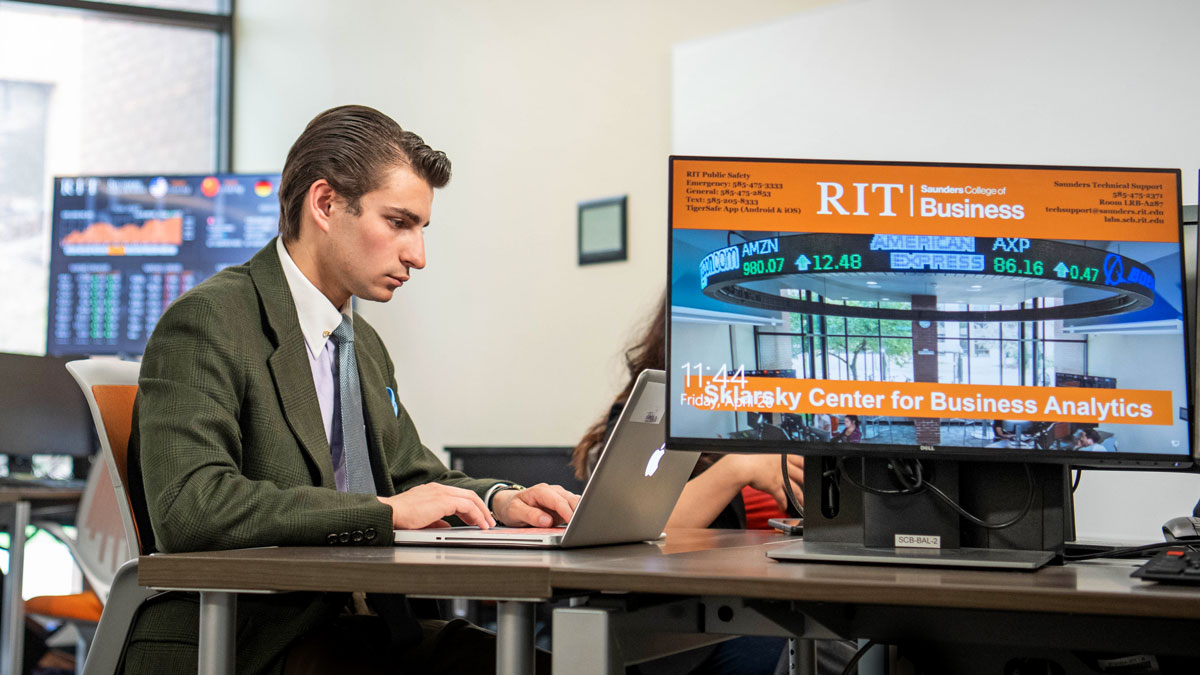Business Exploration

Business Exploration
- RIT /
- Rochester Institute of Technology /
- Academics /
- Business Exploration
Undeclared business majors can take up to a year and half to explore RIT’s seven business majors before deciding on which one meets your career goals and aspirations.
Overview for Business Exploration
For students who are interested in business but unsure which major bests meets their professional goals.
Explore all of our business majors while completing The Freshman Experience: Biz 1+2, a course where you'll build a business plan as a cohort with all first year business students.
Take up to a year and half to explore RIT’s business majors without losing time toward graduation.
Are you interested in pursuing a career in business, but uncertain as to which major best fits your personal and professional goals? Business exploration might be the best fit for you.
Majoring in Business: How to Decide on a Degree
Business exploration is for students who are not yet ready to declare a business major and need more time to explore different business disciplines to better understand which major bests meets their interests and career goals. It's designed to keep you on track for graduation while you explore entry-level courses in RIT's seven business majors: accounting, finance, global business management, hospitality and tourism management, management information systems, marketing, or supply chain management.
In business exploration, you can take up to a year and a half to complete course work in general business topics while you explore foundation courses in several of the business majors that interest you most. In your first-year, you will be encouraged to talk with RIT faculty, staff, and our career advisors to help you learn about our different business majors as you determine which areas of business interest you most. Advisors provide guidance throughout your time in the option and will assist you in course selection and in declaring a major.
The Freshman Experience: Biz 1+2
Students pursuing business exploration will participate in The Freshman Experience: Biz 1+2, a two course, two semester experience where all business students participate as first-year students, together as a cohort. This is a unique aspect of a business degree at Saunders College of Business. At many business schools, students do not take business courses until their second or third year of study. In Biz 1+2, you will build business plans from concept to commercialization while being exposed to a variety of different disciplines. The experience allows you to confirm your choice of major, change your major, or pursue a double major.
-
#77 Best Business Undergraduate Programs, 2025
RIT’s business degrees are ranked among the Best Undergraduate Business Programs nationally.
Curriculum for 2024-2025 for Business Exploration
Current Students: See Curriculum Requirements
Business exploration, typical course sequence
| Course | Sem. Cr. Hrs. | |
|---|---|---|
| First Year | ||
| ACCT-110 | Financial Accounting |
3 |
An introduction to the way in which corporations report their financial performance to interested stakeholders such as investors and creditors. Coverage of the accounting cycle, generally accepted accounting principles, and analytical tools help students become informed users of financial statements. (This course is available to RIT degree-seeking undergraduate students.) Lecture 3 (Fall, Spring, Summer). | ||
| MATH-161 | Applied Calculus |
4 |
This course is an introduction to the study of differential and integral calculus, including the study of functions and graphs, limits, continuity, the derivative, derivative formulas, applications of derivatives, the definite integral, the fundamental theorem of calculus, basic techniques of integral approximation, exponential and logarithmic functions, basic techniques of integration, an introduction to differential equations, and geometric series. Applications in business, management sciences, and life sciences will be included with an emphasis on manipulative skills. (Prerequisite: C- or better in MATH-101, MATH-111, MATH-131, NMTH-260, NMTH-272 or NMTH-275 or Math Placement Exam score greater than or equal to 45.) Lecture 4 (Fall, Spring). | ||
| MGIS-130 | Information Systems and Technology |
3 |
To be successful in our globally-networked business environment, contemporary management professionals must have a strong grounding in the principles of information and information technology. This course provides an introduction to the field of management information systems (MIS), including the tools and techniques for managing information and information technologies within organizations. We place a particular emphasis on the nature of systems, the role of information in business processes, the management of data, and the planning of MIS design projects. Lecture 3 (Fall, Spring). | ||
| MGMT-101 | Business 1: Introduction to Business Communication, Planning & Analysis |
3 |
This is the first of a two-course sequence, 4 credit year long experience, comprising the freshman-integrated experience. In Business 1, students will be introduced to the key functional areas of business, discuss current factors, events, and trends that impact business, build professional, personal leadership, communication, and teamwork skills, and evaluate business decisions, and the business plan process. By understanding the key functions of business and analyzing business decisions in Business 1, students will be able to then develop their own business ideas in Business 2. Lecture 3 (Fall). | ||
| MGMT-102 | Business 2: Business Planning and Professional Development |
1 |
This course, the second in the First-year Business 4 Credit Experience, applies business and technology tools to create a modified business plan. Supported by guest speakers on a variety of professional development topics, along with student and professional mentors, students in this project-centered course use the Business Model Canvas innovation tool and learn to identify and communicate the nine key elements of a business model. Students will complete a team project that outlines the business case for a new product or service to address a selected challenge or opportunity. Student teams present a business case in both a one-page document and a 10-minute presentation pitch. (Prerequisites: MGMT-101 or MGMT-150 or equivalent course.) Lecture 1 (Fall, Spring). | ||
| ECON-101 | Principles of Microeconomics |
3 |
Microeconomics studies the workings of individual markets. That is, it examines the interaction of the demanders of goods and services with the suppliers of those goods and services. It explores how the behavior of consumers (demanders), the behavior of producers (suppliers), and the level of market competition influence market outcomes. Lecture 3 (Fall, Spring). | ||
| ECON-201 | Principles of Macroeconomics |
3 |
Macroeconomics studies aggregate economic behavior. The course begins by presenting the production possibilities model. This is followed by a discussion of basic macroeconomic concepts including inflation, unemployment, and economic growth and fluctuations. The next topic is national income accounting, which is the measurement of macroeconomic variables. The latter part of the course focuses on the development of one or more macroeconomic models, a discussion of the role of money in the macroeconomy, the aggregate supply-aggregate demand framework, and other topics the individual instructor may choose. (Prerequisites: ECON-101 or completion of one (1) 400 or 500 level ECON course.) Lecture 3 (Fall, Spring, Summer). | ||
| STAT-145 | Introduction to Statistics I |
3 |
This course introduces statistical methods of extracting meaning from data, and basic inferential statistics. Topics covered include data and data integrity, exploratory data analysis, data visualization, numeric summary measures, the normal distribution, sampling distributions, confidence intervals, and hypothesis testing. The emphasis of the course is on statistical thinking rather than computation. Statistical software is used. (Prerequisites: Any 100 level MATH course, or NMTH-260 or NMTH-272 or NMTH-275 or (NMTH-250 with a C- or better) or a Math Placement Exam score of at least 35.) Lecture 3 (Fall, Spring, Summer). | ||
| STAT-146 | Introduction to Statistics II |
4 |
This course is an elementary introduction to the topics of regression and analysis of variance. The statistical software package Minitab will be used to reinforce these techniques. The focus of this course is on business applications. This is a general introductory statistics course and is intended for a broad range of programs. (Prerequisites: STAT-145 or equivalent course.) Lecture 6 (Fall, Spring, Summer). | ||
| ACCT-210 | Management Accounting |
3 |
Introduction to the use of accounting information by managers within a business. Explores the value of accounting information for the planning and controlling of operations, assessing the cost of a product/service, evaluating the performance of managers, and strategic decision making. (Prerequisites: ACCT-110 or NACC-205 or equivalent course.) Lecture 3 (Fall, Spring, Summer). | ||
| YOPS-10 | RIT 365: RIT Connections |
0 |
RIT 365 students participate in experiential learning opportunities designed to launch them into their career at RIT, support them in making multiple and varied connections across the university, and immerse them in processes of competency development. Students will plan for and reflect on their first-year experiences, receive feedback, and develop a personal plan for future action in order to develop foundational self-awareness and recognize broad-based professional competencies. (This class is restricted to incoming 1st year or global campus students.) Lecture 1 (Fall, Spring). | ||
General Education- First Year Writing |
3 | |
Wellness Education* |
0 | |
| Total Semester Credit Hours | 33 |
|
* Please see Wellness Education Requirements for more information. Students completing bachelor's degrees are required to complete two different Wellness courses.
Admissions and Financial Aid
First-Year Admission
A strong performance in a college preparatory program is expected. This includes:
- 4 years of English
- 3 years of social studies and/or history
- 3 years of math is required and must include algebra, geometry, and algebra 2/trigonometry. Pre-calculus is preferred.
- 2-3 years of science
Financial Aid and Scholarships
100% of all incoming first-year and transfer students receive aid.
RIT’s personalized and comprehensive financial aid program includes scholarships, grants, loans, and campus employment programs. When all these are put to work, your actual cost may be much lower than the published estimated cost of attendance.
Learn more about financial aid and scholarships
Related News
-
February 7, 2025

Bloomberg Enriches Financial Education for 10,000 Students through Global Trading Challenge
Bloomberg reports on the RIT team that won the 2024 Bloomberg Global Trading Challenge.
-
January 2, 2025

RIT trio triumphs in global trading challenge
The team, supported by faculty adviser and finance professor Hao Zhang, won the 2024 Bloomberg Global Trading Challenge.
-
October 11, 2024

RIT students build platform to revolutionize healthcare staffing
The team is the first to earn the Ramsey Family Innovation Award, which will provide annual support for one student team each year enrolled in the RIT Student Accelerator program.
Contact
- Melissa Masline
- Assistant Director Student Services
- Student Services
- Saunders College of Business
- 585‑475‑6571
- menglish@saunders.rit.edu
Saunders College of Business









